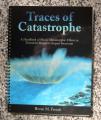
A Photographic Atlas of Rock Breakdown Features in Geomorphic Environments
by Mary Bourke, Heather Viles
Publisher: Planetary Science Institute 2007
ISBN/ASIN: 0978523601
Number of pages: 88
Description:
A comprehensive image collection of rock breakdown features observed on boulders. This atlas is intended as a tool for planetary geoscientists and their students to assist in identifying surface features found on rocks on planetary surfaces.
Download or read it online for free here:
Download link
(15MB, PDF)
Similar books
 Lecture notes on the formation and early evolution of planetary systems
Lecture notes on the formation and early evolution of planetary systemsby Philip J. Armitage - arXiv
An introduction to the theory of the formation and early evolution of planetary systems. Topics covered: the structure, evolution and dispersal of protoplanetary disks; the formation of planetesimals, terrestrial and gas giant planets; etc.
(11241 views)
 Planetary Photometry
Planetary Photometryby Max Fairbairn
The text covers principles of planetary photometry: radiance and the equation of transfer, diffuse reflection and transmission, albedo, scattering and absorption, net flux and exitance, and a brief history of the Lommel-Seeliger law.
(12255 views)
 Traces of Catastrophe
Traces of Catastropheby Bevan M French - Lunar and Planetary Institute
A detailed introduction to impact processes, crater formation, and shock metamorphism. The book is intended for geoscientists of all kinds: students, professors and professional geologists who may encounter an impact structure in the field area.
(13354 views)
 Planetary Science: A Lunar Perspective
Planetary Science: A Lunar Perspectiveby Stuart Ross Taylor - Lunar and Planetary Institute
The technical triumph of manned landings on the Moon and the return of samples from the lunar surface has provided scientists with a unique opportunity to advance our understanding of the nature, evolution and origin of the solar system.
(10422 views)